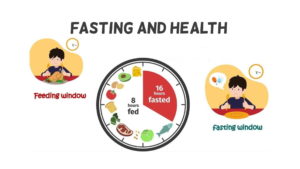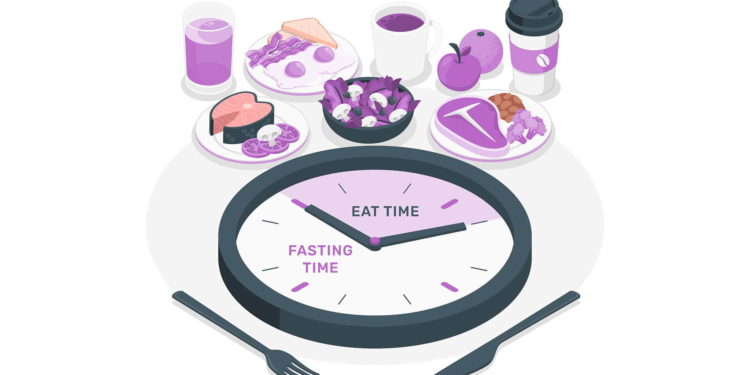Fasting intermittent involves moving between periods of not eating and eating regularly, simply when you eat and when you don’t. Fasting intermittent could be an effective weight-loss technique with possible health benefits, such as disease prevention or reversal. It is a procedure followed by a lot of people but there is a proper schedule and process to follow more like an eating pattern than just not eating or eating.
Let us understand in detail;
It is important to understand many diets teach you what things to eat, but Fasting intermittent differs in that it focuses on when you eat. Timing matters here as it is about fasting.
When you practice intermittent fasting, you eat at specified times and skip meals at other times. Fasting during specific hours of the day or eating only one meal a few days a week can be beneficial to your health.
Fasting intermittent (IF) has received a lot of attention in recent years due to its possible health benefits, which include weight loss, enhanced metabolic health, and increased longevity. This comprehensive guide seeks to provide you with a detailed overview of intermittent fasting, its numerous methods, benefits, getting started recommendations, and considerations for implementing it into your daily routine.
What is intermittent fasting?

Fasting intermittent is an eating habit that alternates between fasting and eating. Fasting intermittent differs from regular diets in that it focuses on when to eat rather than what meals to consume. It does not limit certain food groups, but rather the time frame in which you can consume food.
Fasting, especially for long periods, causes your body to deplete its glycogen stores, which are produced from carbs and stored in the liver and muscles. Once these glycogen stores are depleted, your body begins to rely more on fat reserves for energy. This metabolic change from using glucose to burning fat is known as ketosis. During ketosis, fatty acids are converted into ketones, which the body and brain can use as an alternative fuel source.
Fasting initiates a cellular cleaning process known as autophagy. Autophagy is a natural process in which cells remove damaged or defective components, such as proteins and organelles, and recycle or repair them.
This mechanism promotes rejuvenation and eliminates cellular waste, hence preserving cellular health and function. Fasting may improve overall cellular health and longevity by stimulating autophagic processes.
Fasting can cause changes in hormone levels, including increased production of human growth hormone (HGH). HGH is a peptide hormone that regulates growth, metabolism, and body composition. Its major role is to promote the growth, regeneration, and repair of cells and tissues throughout the body. Increased HGH levels during fasting may increase fat reduction, maintain muscular mass, and improve recovery and repair processes.
Popular Methods of Intermittent Fasting

The 16/8 Method (Time-Restricted Eating) involves fasting for 16 hours and eating only during an 8-hour window each day.
5:2 Diet: Eat normally five days a week and limit calorie consumption to 500-600 calories on the other two non-consecutive days.
Alternate-Day Fasting: Switches between fasting days, where calorie intake is restricted, and non-fasting days, when you eat normally.
Eat-Stop-Eat: Fasting for 24 hours once or twice a week, with no food consumed during that time.
Warrior Diet: Fast for 20 hours each day and consume one huge meal within a 4-hour window in the evening.
Fasting intermittent can help reduce body fat by reducing calorie intake and boosting fat burning.
Improved Metabolic Health: Fasting intermittent may increase insulin sensitivity, lower blood sugar levels, and reduce the risk of type 2 diabetes.
Enhanced Brain Health: Fasting may increase the production of brain-derived neurotrophic factor (BDNF), a protein that promotes brain health and cognitive performance.
Cellular Repair and Lifespan: Fasting induces autophagy, which helps repair damaged cells and may improve lifespan by lowering the risk of age-related disease.
Heart Health: Fasting intermittent may benefit cardiovascular health by lowering risk factors such high blood pressure, cholesterol, and inflammation.
Tips for Starting with Intermittent Fasting

Start Slowly: Begin with shorter fasting periods and progressively increase them as your body adapts.
Stay Hydrated: Drink plenty of water during fasting periods to stay hydrated and avoid hunger.
Select Nutrient-dense Foods: To promote general health and satiety, consume entire, nutrient-dense foods throughout eating windows.
Listen to your body. Pay attention to hunger signs and change your fasting schedule accordingly.
Be adaptable: Experiment with various fasting approaches to determine what works best for your lifestyle and tastes.
Seek professional guidance: Before beginning intermittent fasting, consult with your doctor or a certified nutritionist, especially if you have any underlying health concerns or are pregnant or nursing.
Fasting intermittent has various potential health benefits and can be useful for weight loss and metabolic health. However, it is critical to approach it carefully and about individual needs and preferences. Understanding the concepts of Fasting intermittent and incorporating it deliberately into your lifestyle allows you to reap its benefits and boost overall health and well-being.
Remember, Fasting intermittent is not for everyone, so listen to your body and get expert help if necessary. Intermittent fasting can be a useful tool in your quest for better health if you are patient, consistent, and balanced.













